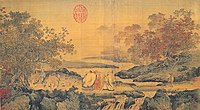
Back الدين في الصين Arabic Çində din Azerbaijani Рэлігія ў Кітаі Byelorussian চীনের ধর্মবিশ্বাস Bengali/Bangla Θρησκεία στην Κίνα Greek Religión en la República Popular China Spanish دین در چین Persian Uskonto Kiinassa Finnish Religion en Chine French चीन में धर्म Hindi
This article may be too long to read and navigate comfortably. (June 2023) |
Religion in China (studies in 2023)[1]




| Religion by country |
|---|
|
|
Religion in China is diverse and most Chinese people are either non-religious or practice a combination of Buddhism and Taoism with a Confucian worldview, which is collectively termed as Chinese folk religion.
The People's Republic of China is officially an atheist state,[4] but the government formally recognizes five religions: Buddhism, Taoism, Christianity (Catholicism and Protestantism are recognized separately), and Islam.[5] All religious institutions in the country are required to uphold the leadership of the Chinese Communist Party, implement Xi Jinping Thought, and promote the sinicization of religion.[6]
- ^ 2023 approximations of the statistics from the China Family Panel Studies (CFPS) of the year 2018, as contained in the following analyses:
- "Measuring Religion in China" (PDF). Pew Research Center. 30 August 2023. Archived (PDF) from the original on 9 September 2023."Measuring Religions in China". 30 August 2023. Archived from the original on 30 September 2023. A compilation of statistics from reliable surveys held throughout the 2010s and early 2020s, with an emphasis on the CFPS 2018.
- Wenzel-Teuber, Katharina (2023). "Statistics on Religions and Churches in the People's Republic of China – Update for the Year 2022" (PDF). Religions & Christianity in Today's China. XIII. China Zentrum: 18–44. ISSN 2192-9289. Archived (PDF) from the original on 23 June 2023.
- Zhang, Chunni; Lu, Yunfeng; He, Sheng (2021). "Exploring Chinese folk religion: Popularity, diffuseness, and diversities" (PDF). Chinese Journal of Sociology. 7 (4). SAGE Publications: 575–592. doi:10.1177/2057150X211042687. ISSN 2057-150X. Archived (PDF) from the original on 15 October 2023.
- ^ For China Family Panel Studies 2014 survey results, see release No. 1 (archived) and release No. 2 (archived). The tables also contain the results of CFPS 2012 (sample 20,035) and Chinese General Social Survey (CGSS) results for 2006, 2008, and 2010 (samples ~10.000/11,000). For comparison, see 卢云峰:当代中国宗教状况报告——基于CFPS(2012)调查数据 (CFPS 2012 report), The World Religious Cultures, issue 2014. "Archived copy" (PDF). Archived from the original (PDF) on 9 August 2014. Retrieved 7 August 2014.
{{cite web}}: CS1 maint: archived copy as title (link) p. 13, reporting the results of the CGSS 2006, 2008, 2010, and 2011, and their average (fifth column of the first table). - ^ a b c d e Wenzel-Teuber, Katharina. "Statistics on Religions and Churches in the People's Republic of China – Update for the Year 2016" (PDF). Religions & Christianity in Today's China. VII (2): 26–53. Archived from the original (PDF) on 22 July 2017.
- ^ Dillon, Michael (2001). Religious Minorities and China (PDF). Minority Rights Group International.
- ^ Albert, Eleanor; Maizland, Lindsay. "Religion in China". Foreign Affairs. Council on Foreign Relations. Retrieved 4 May 2022. In the early 21st century, there has been increasing official recognition of Confucianism and Chinese folk religion as part of China's cultural heritage.
- ^ Cite error: The named reference
:0was invoked but never defined (see the help page).
Cite error: There are <ref group=note> tags on this page, but the references will not show without a {{reflist|group=note}} template (see the help page).
© MMXXIII Rich X Search. We shall prevail. All rights reserved. Rich X Search